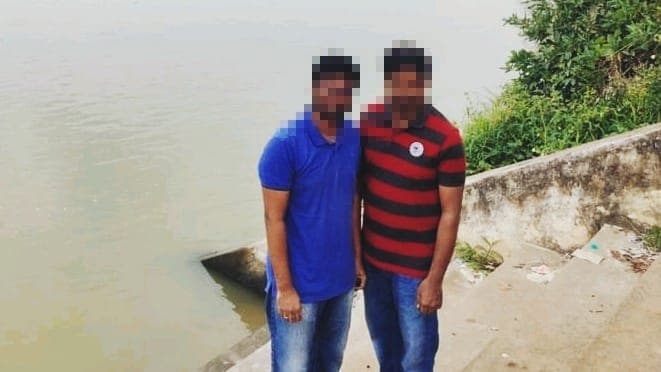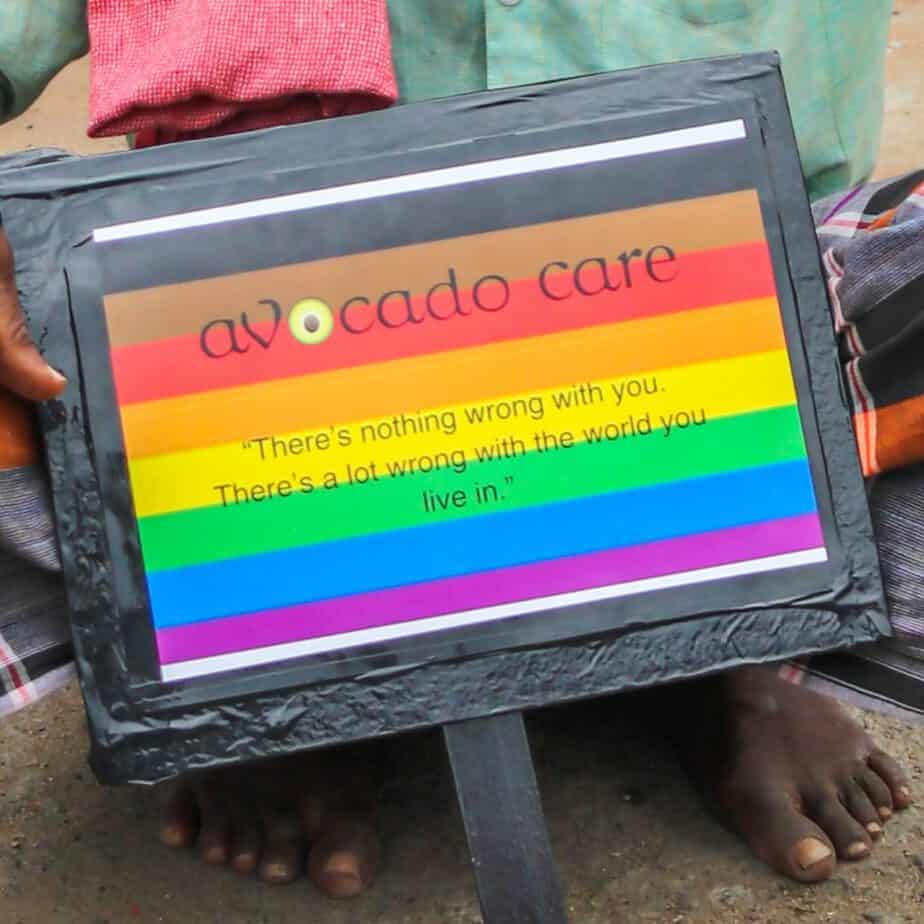Reminiscing moments from the early days of their romance, J Prasanna (30) and M Murugan (34) celebrated their 12th year anniversary over a simple feast two months ago. It was a celebration that marked the triumph of love in a homophobic society.
Murugan loves Ilayaraja’s music, while Prasanna is a devout Sam Smith fan. Murugan is an avid reader of the works of Sujatha and Kalki and Prasanna pores over anything that is written by Sydney Sheldon or Jeffrey Archer. Testament to the common adage that opposites attract, Murugan and Prasanna fell in love in 2008, finding solace in each other’s company.
However, life has not been easy for this couple. From decisions such as opening up about their sexual orientation, to going public with their relationship, the journey has been arduous.

Riding high on the promise of cosmopolitan life that megacities offer, many individuals like Prasanna and Murugan migrate to Chennai, where they hope to avoid being judged on the basis of their sexual orientation. But, is Chennai really as open-minded as they expected it to be?
Mostly accommodative, but aloof
For Prasanna, Chennai was an escape from his traumatic childhood in the small town Vellore. Unlike in Vellore, he expected his classmates at the College of Engineering, Guindy to accept him as he grappled with questions about his sexuality. “No one assaulted me physically in college like in school,” Prasanna says. But he realised he could not discuss his sexuality with his roommates or classmates in college. “I felt they were not mature enough to understand me,” he adds.
The diverse nature of the campus came to his aid. He began mingling with NRI students on campus. “They did not discriminate against a person based on orientation or caste or academic performance. There was no need to fake my identity when I was around them,” Prasanna, an IT professional, adds.
Being away from his family was an added advantage for Prasanna. He got ample time for reflection and took almost a year to identify himself as gay.
On the other hand, Murugan had to wait until he could begin working to get away from his remote village near Dharmapuri. He took up a job in Chennai to support his family as a first generation graduate. The move finally gave him the space and time to think about his own sexual identity.
Four years ago, 24-year-old Sridhar, an independent researcher from Vellore, came to Chennai to pursue a masters’ degree. He saw the city as a safe place to explore his identity. “I was certain about my sexual orientation as early as in school. But I could not discuss it with anyone. After migrating to the metropolitan city, I met many people from the gay community here,” he says.
He then began engaging with organisations that work with the LGBTQ+ community in Chennai. He continues to participate actively in pride walks, international film festivals and reading sessions focussed on the LGBTQ+ community.
“I was not discriminated against for being different. I have a platform to discuss issues faced by the community. This opportunity was absent in my hometown,” Sridhar adds.
Chennai has been considered a safe space for many members belonging to the LGBTQ+ community. This is the perception that drives many people in the villages and tier-2 cities in Tamil Nadu to consider migrating to Chennai, with the hope that they will be able to live freely without discrimination.
But stigma and discrimination do exist, as Sridhar avers. “Name calling and backbiting still continue to haunt the members of the marginalised community in institutions and in pockets that are not progressive,” he adds.
To come out or not?
Sridhar’s observation is borne out by the instance of Prakash Menon. All hell broke loose when Prakash, a journalist, came out before his parents last year. From taking him to a psychologist to performing pujas in the famous temples of Chennai, his parents tried everything to “convert” him. Prakash’s parents are educated, yet completely insensitive to his feelings.
By the time Prasanna turned 26, his parents had begun pressuring him to get married. He tried to stall the process for a few years, but then came out with the truth eventually.
“I could not handle the stress and I told my parents about my sexuality. What followed was months of blackmailing and gaslighting,” he says. Prasanna decided to give his parents some time to process the information. It took them around four months to accept his identity.
Murugan knows the consequences if he comes out to his family, and chooses to keep it a secret from his parents. “They cannot accept this; they will resort to conversion therapy and find out ways to convince me. I do not know if I will ever be able to be myself with them,” he says.
Sridhar, on the other hand, is worried about the future of his younger sister if he decides to come out. He is also deeply concerned about how long he can continue managing the constant internal struggle.
How friendly is Namma Chennai?
Compared to other tier-2 cities in Tamil Nadu, the number of organisations in Chennai working to uplift the marginalised community is more in Chennai. “However, the challenges faced by the community are enormous. Many organisations lack enough manpower for initiating more activities that can help the community,” says Sridhar.

How can organisations working on the ground help make an impact? Sunil Menon, founder of Sahodaran (an NGO working for the LGBTQ+ community), says that there is a dedicated counselling centre for the community. “However, many people do not seek help while convincing their parents. Many of them see migrating to a different city and living away from their families as the only viable solution,” he says.
Those who move to the city for academic reasons also often do not find the institutions to be safe space. “Forget resolving the issue, complaints associated with homophobia often go unreported. Educational institutions are trying to be inclusive, but it is happening at a slow pace,” Sunil adds.
Delfina, a volunteer with the NGO Nirangal (a crisis support group for sexual minorities) says, awareness and sensitisation drives should be continuously carried out. “Judicial judgements, guidelines and policies should be broken down in simple terms for common people to understand and can be prominently published by media houses. Besides the problems faced by the community, stories of positive experiences should also be showcased. Parents gain confidence and develop acceptance when they hear of positive incidents,” she says.
How to create an inclusive and welcoming society
Delfina and Prasanna share some pointers:
- Introduce yourself to gender pronouns and ask if the individual wants to be addressed with a particular pronoun.
- Use gender-inclusive language. Examples: Folks/everybody/everyone instead of ladies and gentlemen, child instead of son/daughter, etc.
- Be open to learning, always. If you are unaware of the types of gender/sexual orientation, seek help from the members of the LGBTQ+ community to know more.
- Do not ask about an individual’s private life if the individual is not willing to discuss it
- Do not discriminate others based on their gender/sex orientation
- Do not have preconceived false notions. For instance, there is a popular notion that people belonging to the gay community have effeminate behaviour. This statement is not universal; there are many gay men who do not have feminine characteristics.
Here are some Chennai-based organisations that members of LGBTQ+ can approach if they need any help:
| Organisation | Contact details |
|---|---|
| Orinam (support and resources for LGBT people and their families, awareness-raising on issues of sexuality and gender identity, cultural programming, and referrals) | orinamwebber@gmail.com |
| Nirangal (crisis support for sexual minorities (men, women or transgender people)) | nirangal.india@gmail.com |
| Tamil Nadu LGBTQ (support for members of LGBT+ community) | tamilnadulgbt@gmail.com |
| Sahodaran (an NGO working for the LGBTQ+ community) | sahodaranchennai@gmail.com or 98418 65423 |
| RIOV (An online and offline support and social space for lesbians, bisexual women, transmen and allies in Chennai) | riovchennai@gmail.com |
| Chennai Dost (LGB group with social and support spaces for gay and bi men) | chennaidostt@gmail.com |
| Sevigal (a helpline for LGBTQIA+ community and others who want to know about the community. The helpline offers counselling, clears doubts, connect with LGBTQ+-friendly resource persons) | 91769 99974 |
I’m happy that this article exists but there’s not much cases studied to showcase what the title mentions.